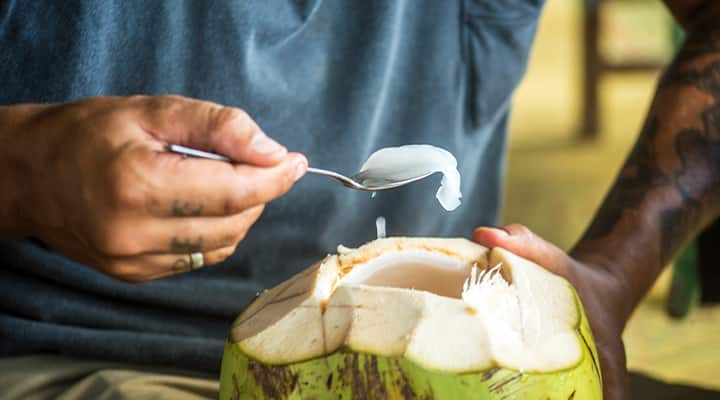
How to Add Coconut to Your Diet: A Buying Guide
Published: May 2024
Need a mental break? Coconut provides a little taste of the tropics that can make the most hectic day feel like a beach day. Whether you are drawn to the creamy consistency of coconut milk, the refreshing taste of coconut water, or the versatility of coconut oil, there is likely a coconut product to suit your needs.
After all, you don't need to be on a tropical island to enjoy the delicious flavor and health benefits of coconut, including the blood pressure support of potassium and more. When incorporated into a healthy dietary pattern such as the Mediterranean diet, coconuts may provide a nutritious source of saturated fats. Coconut also provides antioxidants such as phenols for heart and whole-body health, especially in unprocessed coconut meat form.
Here is your ultimate guide to adding coconut to your diet.
11 ways to add coconut to your diet
Coconut comes in different shapes and sizes, ranging from fresh coconut meat and dried flakes to velvety coconut cream, coconut oil, coconut flour and coconut sugar for your baking needs. Here’s a rundown of each of these types and healthy ways to enjoy them.
1. Coconut milk
Coconut milk is made by blending grated coconut meat with water, and then straining the mixture to extract the liquid. Coconut milk is a tasty and nutritious dairy-free alternative to cow's milk that can be enjoyed in a variety of ways. Coconut milk can be used in all the ways you use cow's milk, such as oatmeal, cereal and baking, as well as savory dishes like curry and soup.
Additionally, coconut milk makes for a creamy liquid base for smoothies. Simply blend together with fruits such as bananas and berries, a handful of spinach for added fiber and nutrients, and protein powder for staying power. This makes a great afternoon treat or breakfast option and is ready in minutes.
2. Coconut cream
Coconut cream is the thick, creamy layer that rises to the top of coconut milk when it sits undisturbed. It contains a higher proportion of coconut fat compared with coconut milk, giving it its thick texture.
Coconut cream is commonly used as an ingredient in curry and can be added to soups and stews. It can also be enjoyed in sweet creations, such as pies, puddings, cakes and ice cream. Easily elevate meals and desserts by topping with a teaspoon dollop of coconut cream.
3. Coconut water
Coconut water, the clear liquid found inside coconuts, is often referred to as nature's energy drink. It is naturally rich in electrolytes, including potassium, sodium, magnesium and calcium. Electrolytes are essential for maintaining proper fluid balance and nerve function. This makes coconut water a great hydrating choice to replenish electrolytes lost through sweat during physical activity and hot weather.
Coconut water can be enjoyed on its own or used as a base for smoothies, homemade popsicles, and cocktails or mocktails.
4. Coconut oil
For a versatile cooking oil with a slightly sweet flavor, turn to coconut oil. This oil is extracted from the meat of mature coconuts. Because it is primarily composed of saturated fats, predominantly medium-chain fatty acids, it is solid at room temperature.
There are two main types of coconut oil: refined and virgin. Refined coconut oil is the more processed variety. It has more of a neutral flavor and aroma, a higher smoke point and a longer shelf life than virgin coconut oil.
Virgin coconut oil is extracted without the use of chemicals or high heat, making it less processed and higher in naturally occurring nutrients. Virgin coconut oil has a lower smoke point than refined and is typically more expensive.
You can use coconut oil as a substitute for butter or other oils in cooking and baking.
5. Coconut butter
Coconut butter, also called coconut manna, is made from pureed coconut meat, which allows it to retain both fiber and the natural oils present in coconut. Like other nut and seed butters, it is creamy and spreadable at room temperature.
Similar to coconut oil, coconut butter can be used as a substitute for regular butter or other oils in cooking and baking. Additionally, it can be used as a spread on toast.
6. Coconut flour
For your gluten-free baking needs, consider coconut flour. Made from dried coconut meat, coconut flour is notably higher in dietary fiber compared with most other flours, with about 10 grams per quarter cup serving. Fiber is important for digestion, promoting the feeling of fullness and heart health.
It is important to consider coconut flour's unique texture and absorbency when baking. Because it is high in fiber, it absorbs more liquid than other baking flours, so recipes will need to be adjusted accordingly. Coconut flour adds subtle coconut flavor to dishes and can be used to make baked goods, pancakes, waffles and more.
Explore Our Best Active Lifestyle & Fitness Supplements
7. Coconut sugar
Coconut sugar is made from coconut sap found inside palm trees. It is often regarded as a more nutritious sugar alternative to refined sugar because of its lower glycemic index and higher nutrient content. You can use it in recipes that call for refined sugar, such as baked goods, tea and coffee, sauces and marinades.
8. Coconut aminos
Coconut aminos is a popular, naturally gluten-free and soy-free alternative to soy sauce that is derived from the sap of coconut blossoms. Because of its similar taste to traditional soy sauce, it can be used as a seasoning for stir-fries, a dipping sauce for sushi, and a marinade for meat. It has sodium, but significantly less than soy sauce.
9. Coconut meat
Coconut meat is the white, edible part of the coconut. It can be enjoyed as a snack or added to recipes like fruit salads and smoothies. Because it is not processed like other forms of coconut, it retains all the nutrition of coconuts, including fat, fiber, vitamins and minerals, including vitamin C, iron, magnesium and B vitamins.
10. Coconut flakes
Coconut flakes, also known as coconut shreds or grated coconut, are small pieces of dried coconut flesh. With a chewy texture and sweet, nutty flavor, they are commonly used in baked goods such as cookies and cakes, as well as granolas and trail mixes. They can also be used for coating proteins like shrimp, chicken and fish for a crispy texture and hint of sweetness.
When shopping, be aware that coconut flakes are sold in sweetened and unsweetened varieties. Flakes with no added sugar are a healthier choice.
11. Coconut yogurt
If you crave the creaminess of traditional yogurt but are looking to ditch the dairy, give coconut yogurt a try. This dairy-free alternative to traditional yogurt is made from coconut milk.
Unlike yogurt derived from cows' milk, coconut yogurt is lower in protein. It can be used similarly to traditional yogurt, such as a standalone breakfast or snack topped with fresh fruit and nuts. It also adds richness and tanginess to sauces, dressings and dips.
What is the healthiest way to eat coconut?
This depends on your health goals. Because each form is made from different parts of the coconut fruit, they vary in terms of nutrition, including fiber, fat, protein, vitamins and minerals.
While all coconut forms can be a nutritious part of a balanced diet, some are better than others, especially if weight loss is one of your health goals. For example, while coconut water is low in calories and a healthy choice to enjoy regularly, coconut oil and butter should be used in moderation due to their high fat content.
Is it OK to eat coconut every day?
While coconut itself provides good nutritional value with a relatively balanced amino acid profile, it is best to alternate with different fruits in your diet to ensure you are getting a range of vitamins, minerals and antioxidants.
However, one study that looked at a group of 80 healthy volunteers found that eating fresh coconut for 90 days supported healthy weight management and helped maintain healthy blood sugar levels.
Does coconut support heart health?
Because different forms of coconut offer different nutrition, the way that coconut benefits your cardiovascular health will vary accordingly. Forms like coconut water and coconut flour can support heart health through naturally occurring electrolytes and fiber respectively.
However, the jury is out on forms like coconut oil and butter. On one hand, coconut oil is primarily composed of saturated fat, and the connection between saturated fat and heart health is a subject of strong debate.
That being said, it should be noted that coconut oil contains lauric acid, a medium-chain fatty acid, which is a different type of saturated fat from that found in red meat. Medium-chain fatty acids are absorbed differently and have been associated with various health benefits, including supporting cognitive function. While large observational studies suggest that different saturated fatty acids have different metabolic health effects on lipids, glucose and insulin, high-quality studies are still warranted.
With all that in mind, when it comes to heart health, it may be best to stick to avocado oil or extra virgin olive oil, which is well-documented to be associated with a host of health benefits.
In addition to the foods you eat, supplements like potassium with magnesium can help support heart health and healthy blood pressure. Find out which nutrients can help support your heart health with a personal recommendation from Life Extension's health needs quiz.
References
- Hewlings S. "Coconuts and Health: Different Chain Lengths of Saturated Fats Require Different Consideration." J Cardiovasc Dev Dis. December 2020. https://www.ncbi.nlm.nih.gov/pmc/articles/PMC7766932/
- Patil U, Benjakul S. "Coconut Milk and Coconut Oil: Their Manufacture Associated with Protein Functionality." Journal of Food Science. July 2018. https://ift.onlinelibrary.wiley.com/doi/10.1111/1750-3841.14223
- Schwingshackl L, Schlesinger S. "Coconut Oil and Cardiovascular Disease Risk." Curr Atheroscler Rep. May 2023. https://pubmed.ncbi.nlm.nih.gov/36971981/
- Vijayakumar V, et al. "Diet enriched with fresh coconut decreases blood glucose levels and body weight in normal adults." Journal of Complementary and Integrative Medicine. February 2018. https://www.degruyter.com/document/doi/10.1515/jcim-2017-0097/html
- "Flour, coconut." U.S. Department of Agriculture. April 2023. https://fdc.nal.usda.gov/fdc-app.html#/food-details/2515382/nutrients
Always be in the know!
Access the latest deals, wellness news, expert health tips & more!











